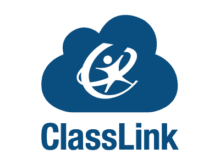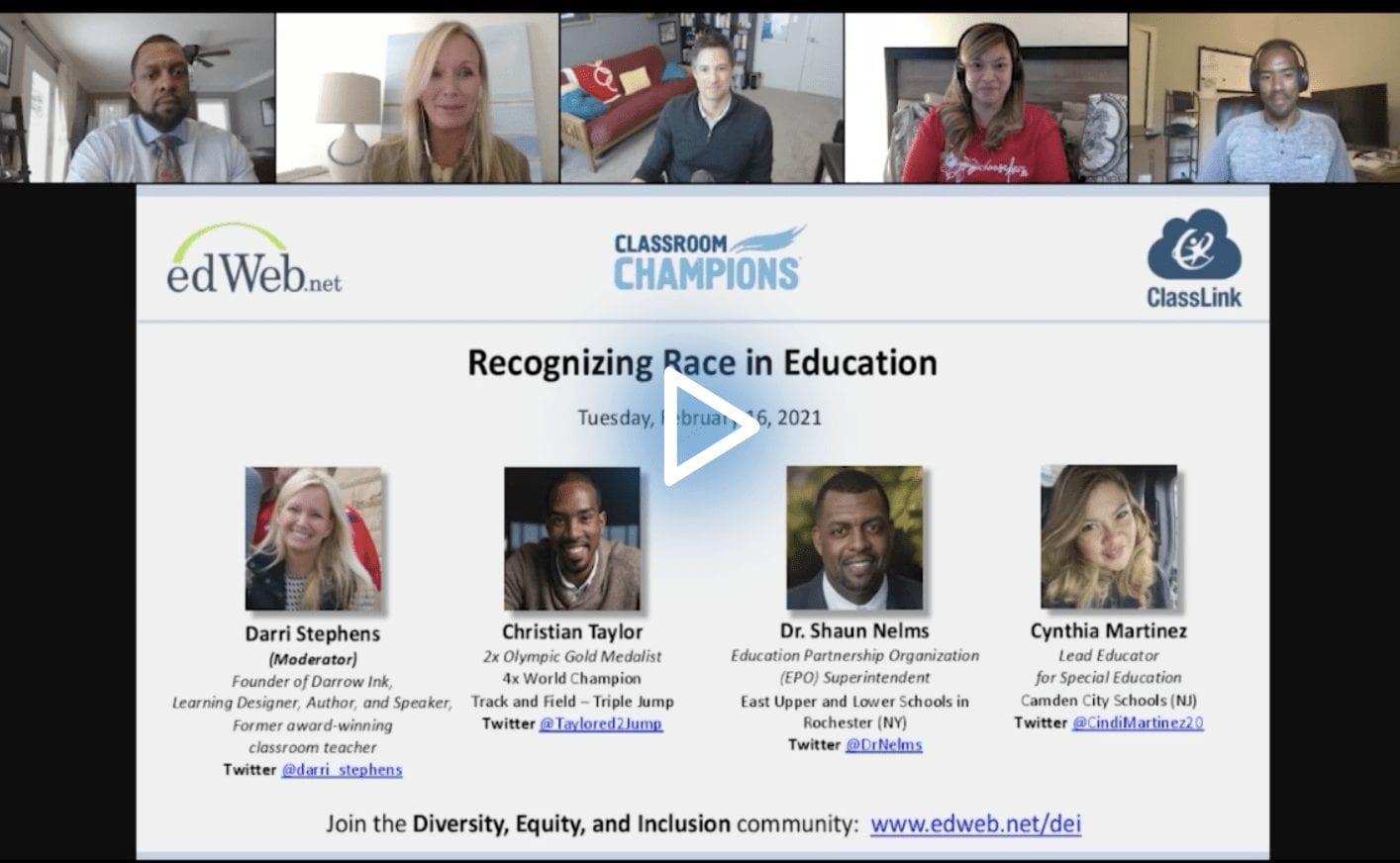Bringing Race to the Forefront in Schools
By Michele Israel
WATCH THE EDLEADER PANEL RECORDING
School systems, school buildings and classroom leaders have the opportunity to model methods to promote racial justice. The approaches will vary, from courageous conversations in the classroom to inclusive, student-centered school design.
Whatever the strategy, strengthening racial awareness and equity in education, emphasized educators in the recent edLeader Panel, sponsored by Classroom Champions and ClassLink, must be purposeful to ensure that all students have the tools to achieve.
The Reality of Race in Education
Talking about race in education calls for highlighting the intersection of access, poverty and equity. All three are factors in how students learn.
Not all schools are created equal, even if they are in the same community. The differences result in imbalanced educational outcomes, particularly in urban schools serving primarily students of color.
“When we talk about race,” explained Dr. Shaun Nelms, Education Partnership Organization (EPO) Superintendent of East Upper and Lower Schools (NY), “we talk about how systemic issues are designed to create a classist system.”
“Unfortunately, in this country,” he added, “Black Americans have always been relegated to the lowest rung on that ladder.”
That placement plays out in the education system, lamented Dr. Nelms. If students do not have the chance to attend schools with enriched programs and services, they will likely go to schools where their chances of graduating and being prepared for college and careers are cut in half.
Race in School: What Is Needed
Broad change is necessary to establish equitable schools. But such change, albeit incremental, can occur in small doses at the local level. The panelists shared experiences and strategies that can give students of color chances to succeed.
Equitable Resources
Not all schools are created equal when it comes to resources. Dr. Nelms knows this all too well. He described a once failing New York State (NYS) high school as an example of what success can look like with the right tools and programs.
For ten consecutive years, the school was on the NYS education department’s persistently failing school list. It was unable to meet benchmarks. Its graduation rate was about 29%. And, it was the lowest-performing high school in the lowest-performing state school district.
The University of Rochester stepped in with interventions that turned the school into a critical success. Now, the graduation rate is 78%. And the student body is the same as it was when it was failing. Behind this change, explained Dr. Nelms, were conditions and resources that were not available when the school was in crisis.
“There were very few functional systems,” he explained, “that guaranteed valuable curriculum, meaningful assessments, teacher empowerment, administrative oversight, teacher and student and parent engagement that focused on student success.”
Students also had a say in the school’s redesign to honor the community’s racial and ethnic perspectives. They wanted a hip hop class and a music room upgrade to learn how to make beats. They wanted a curriculum that reflected them.
Teacher willingness to teach around race, emphasized Dr. Nelms, was critical to the school’s achievements. He partnered with teachers across districts to revamp the curriculum. They explored race from the standpoint of all people’s contributions to society. They discussed the importance of inclusive language. The in-depth exploration and conversations led to new lesson plans, which Dr. Nelms filtered through a culturally responsive and sustaining pedagogy rubric to ensure they met specific standards.
He said that helping educators (especially White teachers) teach around race was critical to the school’s change. Giving teachers a place to start and offering them tools to get past instructional roadblocks allowed for more equitable instruction.
Student Conversations
Cynthia Martinez, Lead Educator for Special Education in Camden City Schools (NJ), believes that students should talk to each other about race. Conversations can start with students discussing their differences and commonalities to build community, she said.
Then, they can move into more courageous conversations about their feelings, especially around insensitive statements that are hurtful—racially, culturally and even spiritually. Students must recognize how certain words have different meanings for others. As students share what they want peers to know and their discussions become more profound and more personal, their understanding of the connection between race and access will likely mature.
Social-Emotional Development
Students, especially of color, need to recognize what they are capable of and know what is possible for them in the future. Christian Taylor, a track and field gold-medalist Olympian, recognizes the value of social-emotional learning in helping young people celebrate diversity.
As a mentor (and a board director) with Classroom Champions, Taylor recognizes the value of encouragement and affirmation in building a young person’s positive sense of self. As a role model, he presents the best version of himself because he knows it inspires students.
Taylor, who is Black, has worked with Martinez’s students, giving them the opportunity to see “someone that looked like them achieving things they may not have thought they could ever do.”
He challenged the students, recalled Martinez. He asked them to set goals, put time stamps on them to be accountable for reaching those goals, even if it meant failing forward now and again. Ultimately, he made them stronger because they saw that Taylor believed in them.
Change Agents
School leaders, contended Dr. Nelms, can effect change to break down barriers to racially driven educational access. They must first have a clear purpose and be decisive about what they want to accomplish to create an effective plan.
“I always think about my work,” he shared, “as being an opportunity to provide equity and access for all students. And then for all staff and parents in our community.”
“By doing that,” he continued, “when making decisions about curriculum, staffing or operational changes, I filter them through a lens of equitableness. Is this providing access to kids who wouldn’t get it normally? Is it allowing someone to be left behind because of a system I am promoting? Are my practices and beliefs challenging policy?”
Leaders must be introspective about the purpose of their work if their schools are to move toward equity. They must be prepared to respond and lead through pushback from those who do not want to see equity at the center of their work. And they must ensure that they work closely with context experts who get at the core of the work happening in school to design appropriate content.
“So I think,” mused Dr. Nelms, “this is all at the core of change, at the core equity, at the core of really creating a plan that’s reflective and representative of the community that we seek to serve.”
This edWeb broadcast was sponsored by Classroom Champions and ClassLink.
WATCH THE EDLEADER PANEL RECORDING
About the Presenters
Cynthia Martinez is an educator in Camden City, New Jersey. She received her bachelor’s degree in special education from Rowan University, a master’s in educational leadership from Walden University, and is currently working on her doctoral degree in educational leadership with a concentration on social justice at Rowan University. She is currently a lead educator for the Special Services Department. Prior to her supervisory role, Cindi taught special education for 23 years at various traditional public schools in Camden. Her last years in the classroom were spent at Cooper’s Poynt where Cindi was introduced to Classroom Champions by the school librarian. Special education and social justice are her passion because she believes all children can learn from someone who believes in them.
Christian Taylor is a two-time Olympian (2012, 2016) and two-time Olympic gold medalist, as well as four-time World Champion in the sport of track and field. His specialty is the triple jump. Christian started his career as a standout track and field athlete, setting state high school records in the long jump, triple jump, and 400m. He went on to graduate from the University of Florida, where he racked up both indoor and outdoor National Championship titles and a 2011 World Championship. In 2012 at the Olympic Games in London, Christian won in dramatic fashion after scratching on his first two jumps. In 2015, Christian was part of the “greatest triple jump competition” ever, where he jumped over 18 feet and won gold in the World Championships. While competing, Christian has mentored thousands of students with Classroom Champions and has studied for his master’s degree at the University of Florida, which he just completed in December 2019! Christian also sits on the Board of Directors for Classroom Champions.
Shaun Nelms, Ed.D. is the superintendent of East Upper and Lower Schools, a new position created through a unique partnership among NYSED, the Rochester City School District, and University of Rochester. Dr. Nelms has been charged with creating a school reform model that can be replicated throughout the U.S. In 2018, he was named the first William and Sheila Konar Director for the Center for Urban Education Success (CUES) at the University of Rochester’s Warner School of Education. In this role, Dr. Nelms leads the center’s efforts to support the success of K-12 urban schools both locally and nationally through a combination of research, relationship building, and a commitment to pursue and share best practices. A graduate of the University of Rochester, Dr. Nelms received his doctorate in K-12 school leadership and master’s in education. He holds a bachelor’s degree in education from SUNY Fredonia.
About the Moderator
Darri Stephens is a former member of Teach for America and a seasoned educator, with more than 10 years’ experience in Los Angeles and New York City public schools. She’s a published author, who has also worked for education-focused media companies including Nickelodeon, IMAX, EdSurge, and Discovery Education. With master’s degrees in education from both Harvard and Stanford, she’s passionate about creative curriculum development that pushes boundaries, especially considering the influx of today’s technologies. Her most recent positions as Senior Director of Content at Common Sense and Director of Education at Wonder Workshop underscore her love of instructional design, writing, and the ever-changing edtech world—so much so that she has now founded her own content consulting agency, Darrow Ink.
Join the Community
Diversity, Equity, and Inclusion is a free professional learning community on edWeb.net for educators to collaborate around creating equitable learning environments in schools and districts, and for remote learning.
Classroom Champions is a non-profit and registered charity that connects volunteer Olympians, Paralympians, and Professional Athletes to classrooms through a K-8 social and emotional-based curriculum and mentorship experience.

Michele Israel writes about the ideas and best practices that are shared in edWeb’s edWebinars so they can spread innovative and best practices to the education community. Michele owns Michele Israel Consulting, LLC, which serves large and small educational, non-profit, media, corporate, eLearning, and blended learning organizations to bolster products and programs. Her rich career spans over 25 years of successfully developing educational materials and resources, designing and facilitating training, generating communication materials and grant proposals, and assisting in organizational and program development. In addition to lesson plans and other teacher resources, Michele’s portfolio includes published articles covering a range of educational and business topics.





Comments are closed.